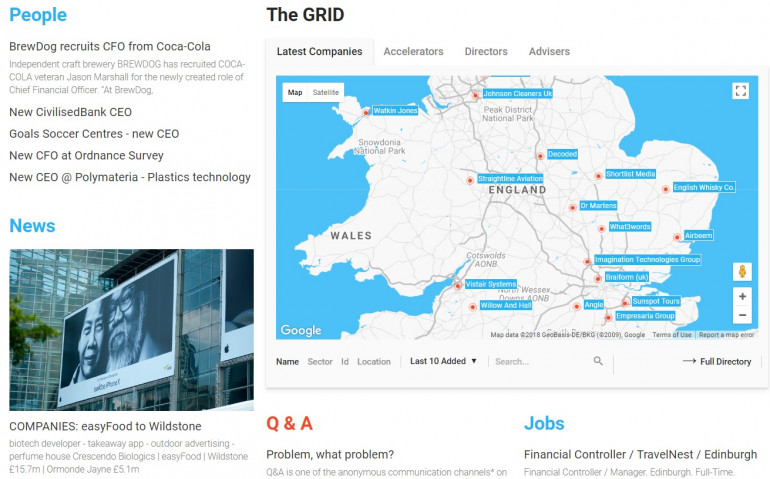Published by Directorzone Markets Ltd on September 1, 2017, 9:00 am in Knowledge, Market Info
Wednesday January 1st 2020

Hype Cycle: AI to 5G | Unsellable Shares | eCigarettes Business | Personal Data Timebomb | Crowdfunding Rules | Craft Beer Boom | UK Legal and Accountancy Dominance
Digest of news and trends in the GRID marketplace in August 2017.
HYPE CYCLE: AI TO 5G
Gartner Hype Cycle 2017: Artificial intelligence at peak hype, blockchain heads for disillusionment, but say hello to 5G | Lynsey Barber, City A.M. August 17
See City A.M. article for graph of Gartner's annual Hype Cycle which tracks the progress of emerging technology trends, from early innovation to becoming a household must-have, including:
• DEEP LEARNING and MACHINE LEARNING are at what it calls the "peak of inflated expectation", but are just two to five years away from mainstream adoption.
• Cognitive Computing is also at peak hype, but up to 10 years away
• …general ARTIFICIAL INTELLIGENCE remains more than a decade away and is still at the stage of early innovation.
• Mainstream BLOCKCHAIN TECHNOLOGY … now passing into the "trough of disillusionment”
• 5G technology….pinpointed at the early innovation stage
• … VIRTUAL REALITY … now two to five years away, compared to between five and 10 this time last year.
• AUGMENTED REALITY …at least five years away.
UNSELLABLE SHARES
Ten years later, I still can’t shift my shares | Jill Insley, The Sunday Times. August 13
Reader issue: “In 2007, I purchased 3,000 shares in a company called PHICO THERAPEUTICS, based in Cambridgeshire. I have made inquiries several times over the past five years to find a buyer for them but with no luck. When I purchased the shares, I had no expectation that I would still be holding them more than 10 years later. ….Most of the original investors were members of the CAMBRIDGE CAPITAL GROUP (CCG), a private syndicate of international business angels that supports early-stage technology ventures in Cambridge, Oxford and London.”
Jill Insley: “Phico Therapeutics is a biotechnology company involved in developing a new type of antibiotic that deactivates bacterial DNA, stopping bacteria from metabolising or reproducing. It has raised more than £20m from investors, with awards from the Wellcome Trust charitable foundation and government grants. … the company is unquoted .. means there is no ready-made market to match potential buyers with sellers.”
Danny Cox, head of financial planning at HARGREAVES LANSDOWN, said: “You could approach the directors of the company … but you would have to offer them a substantial discount ….” Alternatively, he suggested, you could look at a service called ASSET MATCH, which works with unlisted companies to hold auctions for shares. In 2014, it held an auction of shares worth £268,373 in craft beer company BREWDOG, while in April last year an auction traded TOTTENHAM HOTSPUR shares worth £445,208.
Stuart Lucas, founder and co-chief executive of Asset Match ….estimates there are 3,000 unlisted companies in the UK with 500,000 shareholders who might be grateful to release their money. “Phico Therapeutics has been around for 17 years and has 158 shareholders.”
Reader comment: James Murdoch “… SEEDRS, the Equity Crowdfunding company, have an embryo secondary market for investments made through their platform.”
eCIGARETTES BUSINESS
Clouds gather over the vaping pioneers | Peter Evans, The Sunday Times. August 13
A decade after ecigarettes appeared in Britain, the industry is booming. …Retail sales of the products, which heat nicotine-laced vapour to deliver a hit similar to the real thing, are forecast to top £800m this year. There are now 2.9m regular users in Britain, according to the charity Action on Smoking and Health, an increase of 11.5% in the past two years.
The UK Vaping Industry Association … estimates that there are about 2,000 vape shops in Britain, almost all run by small businesses. …In the past three years, big tobacco has snapped up some of Britain’s fastest-growing vaping companies. The giants have also put billions into developing their own products, taking market share.
The range of choice is staggering, from packs of disposable cartridges for £5 to luxury pipe devices for £200. The Medicines & Healthcare Products Regulatory Agency — the government’s health watchdog — has received more than 30,000 applications for vaping products.
… will ecigarettes remain legal? …nicotine is addictive. The US Food and Drug Administration last week launched a crackdown on ecigarette use among young people. A European directive that came into force this year restricted advertising and reduced the maximum strength of nicotine liquids. Complying is relatively easy for a slick listed company, but can be an enormous expense for a start-up.
The uncertainty has hindered the ability of some start-ups to raise finance.
PERSONAL DATA TIMEBOMB
UK data laws enter Facebook era | Barney Thompson, FT. August 9
Later this year, the government will introduce the EU’s new GENERAL DATA PROTECTION REGULATION into UK law as the data protection bill, promising to tilt the balance of power over who controls personal data towards the consumer. The EU regulations come into force in May 2018. With potentially huge fines for non-compliance — £17m or up to 4 per cent of global annual turnover in the most serious cases — organisations are assessing how ready they are for the changes.
“Under the regulations, the definition of ‘personal data’ will be extraordinarily broad — any information that is related to a person,” said Lisa Peets, a partner at the law firm COVINGTON. “Companies are finding out that they are processing a lot more personal data than they had realised.” That means online identifiers such as IP addresses, the location data from smartphones, or web browsing cookies will count as “personal”. Collecting and using this data without explanation will be a breach of the new law.
There are also changes affecting the automated use of personal data, including profiling, where data are used in decisions that significantly affect an individual. … “special categories” such as racial or ethnic origin, political, religious or philosophical beliefs, trade union membership, as well as genetic data and biometric data …cannot be processed under the new rules without “explicit” consent.
The new rules will force organisations to explain what they are collecting and why, and in some circumstances get our consent to do so. We will also be able to withdraw that consent at any time and ask for our data to be erased.
T&C.; The government has said: “The reliance on default opt-out or pre-selected ‘tick boxes’, which are largely ignored, to give consent for organisations to collect personal data will also become a thing of the past.”
Mobile phone operators will have to explain what personal data they are collecting and then also reveal the third parties, such as the data management platform that cleans and restructures them, and the marketing and advertising businesses that they are sold on to.
In a recent survey of more than 900 companies, 31 per cent claimed to be ready for the new EU rules, but almost a fifth of those admitted they could not erase or modify personal data. …More than 61 per cent of the same group said it would be hard to identify and report a data breach to the regulator within 72 hours of becoming aware of it, a mandatory requirement.
CROWDFUNDING RULES
Watchdog awakens to the crowdfunding conundrum | Peter Evans, The Sunday Times. August 6
…. early autumn, … publication of a long-delayed review into the rules of crowdfunding by the Financial Conduct Authority (FCA). Crowdcube and Seedrs, which together account for about 70% of total crowdfunding investment, say companies who list on their platforms must go through a rigorous due diligence process.
Critics of crowdfunding say some form of action is crucial following a series of scandals:
• Last year, it emerged that claims management business REBUS had hired restructuring specialists Resolve to address a cashflow crisis — a fact not disclosed when it raised more than £800,000 on CROWDCUBE. The company subsequently collapsed, wiping out investors’ cash.
• When mobile payments company DROPLET raised more than £500,000 in May 2015 …The investment pitch boasted of 30,000 users across 600 businesses and a five-star rating for its payments app. But reality came crashing in just 14 months later. ….its app has been removed from sale.
• Luxury shoe maker UPPER STREET went into administration last year not long after raising £244,000 on SEEDRS, another crowdfunding site.
Despite the calls for greater scrutiny, there is no doubt that crowdfunding is a valuable source of finance for small businesses. In the past year, £200m was invested in fledgling firms through the top four funding sites, according to Beauhurst, a market researcher. … there have been some notable successes. CAMDEN TOWN BREWERY raised nearly £3m through crowdfunding before selling out two years ago to Anheuser-Busch InBev, the world’s biggest beer company, in a deal thought to be worth £85m. Scottish accounting software company FREEAGENT raised £10.7m when it listed on AIM last year. It, too, had roots in crowdfunding.
CRAFT BEER BOOM
London celebrates international beer day with craft brewing success | Barney Thompson, FT. August 4.
Craft brewing has breathed new life into British beer. According to Fourpure, there are 1,700 craft breweries in the UK, the highest rate per capita in the world. UHY Hacker Young, the consultancy, says 10 breweries opened every week in 2016. Craft beer has a 9 per cent share of the beer sold in licensed premises in the UK, showing its scope for growth. In the US it has 20 per cent of the entire market.
In a grimy streak of south-east London, a cluster of small breweries nestles among scrap metal merchants, garages, tool hire companies and dusty lock-ups. The arches under the viaduct from London Bridge are now home to the Bermondsey Beer Mile, a collection of seven craft breweries. Starting with the SOUTHWARK BREWING COMPANY and neighbouring Anspach before ending at FOURPURE, next to South Bermondsey station, the brewers along the beer mile are having a busy few days.
“This area was once known as London’s larder,” says Jack Hobday, the co-founder of one of the breweries, ANSPACH & HOBDAY. He points at the 19th century railway viaduct above. “The locals would take the train to Kent for a holiday picking hops,” he says. Just down the road, in Borough Market, is the old Hop Exchange.
The opportunity for growth, and the success so far, has not gone unnoticed by larger drinks companies. AB InBev bought CAMDEN TOWN BREWERY in 2015, SABMiller took over MEANTIME the same year before selling it to Asahi in 2016, while Carlsberg purchased LONDON FIELDS last month.
UK LEGAL AND ACCOUNTANCY DOMINANCE
Legal and accountancy businesses generate £15.5bn for UK Treasury | Barney Thompson, FT. August 4
Legal and accountancy businesses and their workers generated £15.5bn in taxes last year, according to a report that illustrates the scale of the combined sector’s role in the UK economy. The report was compiled by PwC for The CityUK, the lobby group for financial and related services.
In all, 60,470 firms — ranging from the Big Four accountants and the elite “magic circle” law firms to small businesses and sole traders — employed 693,000 people in the UK in various roles, from partners to back-office workers. That amounts to almost a quarter of all legal and accountancy employees in the EU, making Britain the largest employer in the sector, ahead of Germany and France.
Miles Celic, chief executive of TheCityUK, said: “This expertise isn’t just located in London. Right across the UK, centres of excellence, including Manchester, Bristol and Edinburgh, are adding value to the UK economy.”
The sector’s contribution to the economy is not all positive, however. Data from the Office for National Statistics released earlier this year showed that, along with banking, telecoms, energy suppliers and management consultancy, legal and accountancy services were among the sectors mainly responsible for Britain’s stubbornly poor productivity growth over the past decade.
Work for the biggest legal and accountancy firms is closely linked to activity in the financial services sector, and the City is watching closely for signs of the impact on areas such as mergers and acquisitions or international trade of Britain’s departure from the EU.








